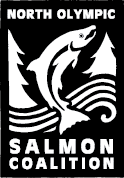
Documentary Screenings
Reaching Blue: Finding Hope Beneath the Surface
March 17th, 6:30pm
Quimper Unitarian Universalist Fellowship
Memory of a Fish
A Tribute to Dick Goin
April 7th,
7pm (Doors 6pm)
Peninsula College
Volunteer Opportunities
Environmental Educator
Questions? Contact Olivia
360.379.8051
|
|
THANK YOU
BINGO BUDDIES!
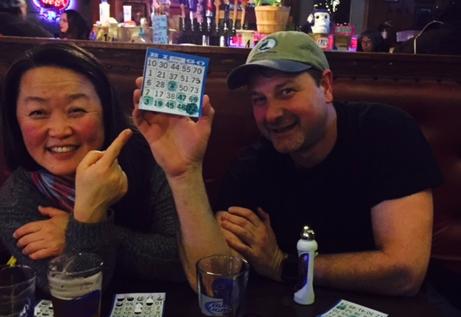
A big thanks to the Hilltop and all of our friends who came out to play BINGO and support us.
Together we raised $4,164.50! Yes, that's a record.
|
Salmon Safe Beer Starts on the Farm
Look for this label on brews and wines at the PT Food Co-Op!
More info can be found
here
.
|
|
We Love Birds!
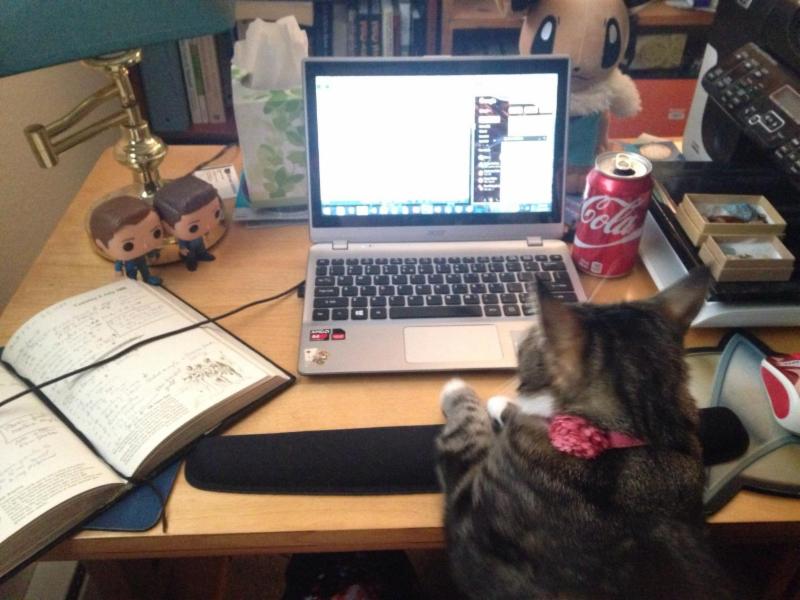
Volunteer cat, Nowi-Noel, aids volunteer human, Dana Olsen, in digitizing 30 years of bird monitoring data from 1983 through 2014.
|
|
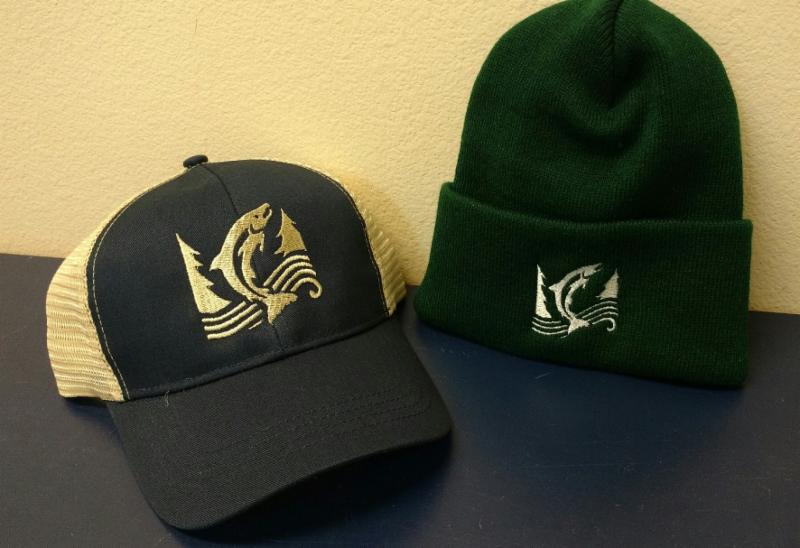
Contact Salmon Coalition to arrange a purchase 360.379.8051 |
|
Follow NOSC on Facebook
Donate by shopping!
Click the link below and select "North Olympic Salmon Coalition"
|
|
What We Accomplish Thanks to AmeriCorps
Salmon Coalition AmeriCorps members pose in front of a house they helped build with Habitat for Humanity at the 2017 MLK Day of Service
Across the nation, young people everywhere are taking on careers in conservation because of AmeriCorps - a program that provides jobs and instills career confidence in our rising generation all the while cleaning up polluted places and restoring declining habitat. Yet unfortunately, this program is in jeopardy of being cut completely. So we thought we'd share why we at the Salmon Coalition think AmeriCorps is such a vital program.
"Annually, our crew plants between 15,000 and 30,000 trees, maintains about 20 revegetation sites, treats about 10 - 20 acres of noxious weeds, builds about 1,000 feet of fencing and goes on disaster response - among other things."
-Owen French, Crew Supervisor
"I began my career in conservation as an AmeriCorps member. My experiences in the program drove me to continue in this field as a life-long career move, taking me all the way to being the Executive Director of Salmon Coalition."
-Rebecca Benjamin, Executive Director
"Over the last 6 years, I have had the honor and pleasure to work with over 35 AmeriCorps WCC members. Trees that were planted by the first crew 7 years ago, are now starting to provide shade and wildlife habitat. Tons of Creosote pilings that were removed from our beaches are now no longer polluting our shorelines. AmeriCorps graduates now work for our State Parks, Department of Fish and Wildlife, Conservation Districts and local Land Trusts. I, myself, began working with the Salmon Coalition as an AmeriCorps member 8 years ago, and I am still here now."
-Sarah Doyle, Stewardship Coordinator
"After just one semester of our Real Learning Real Work program, over a hundred middle school students will have gained real work experience planning a revegetation guide at a specific site, doing everything from making a scale map of their area to planting the species they picked out. Without my contributions to the program, it wouldn't have been able to continue this year."
-Olivia Vito, AmeriCorps IP for Education and Outreach
To help this program continue, click here to send a quick e-mail to your congress representatives now.
Real Learning Real Work Kicks Off!
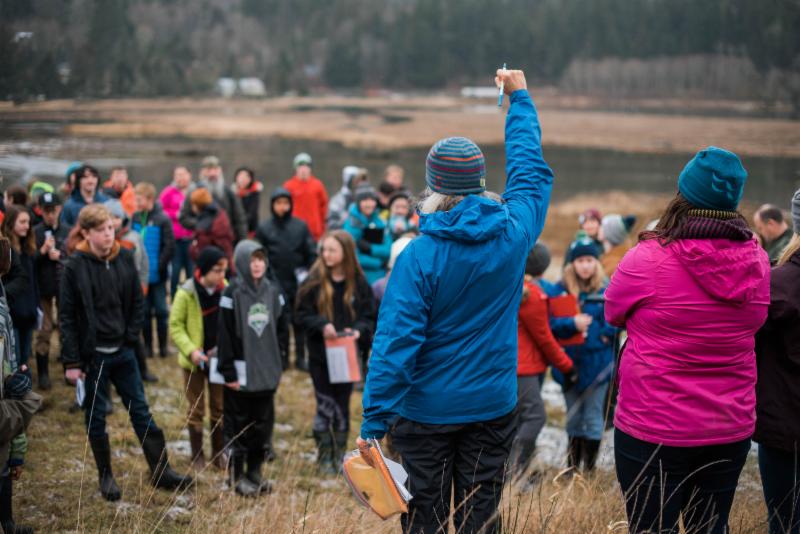
Education Program Manager, Chrissy McLean, kick-starts a day of hands-on learning at Snow Creek Estuary
The Real Learning Real Work program continues this year at both Blue Heron and Clallam Bay Middle Schools
Earlier this month, 13 Salmon Coalition volunteers, 3 staff, 3 teachers, a handful of parent volunteers, and 77 seventh grade students all converged upon a grassy field by the Snow Creek Estuary in the name of science. Students learned about what makes a healthy estuary for salmon, other wildlife and the ecosystem as a whole before turning to their experimental plots to take measurements. Now, back in the classroom, students are working on scale-drawings of their plots and on picking out which tree species to plant where based on water and light loving qualities.
The program also began for Clallam Bay Middle School students this month, taking both 7th and 8th graders out to the Hoko River to check out large woody debris jams and qualities that could improve the habitat.
Interested in volunteering with Salmon Coalition as an Environmental Educator this spring?
We have several more opportunities coming up this spring. Check out our online calendar here for dates and more information.
Documentary Film Screening
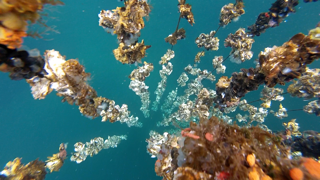
The Salmon Coaltion invites you to a screening of
Reaching Blue: finding hope beneath the surface. This film
tells the story of an oyster farmer, a writer and an ocean scientist who all face the impacts of climate change, while finding hope for the future beneath the Salish Sea.
The producer Ian Hinkle, who once lived in Port Townsend, will be in attendance to answer questions and be honored in a post-screening reception. Delicious local snacks; including raw oysters, Mt. Townsend Creamery cheese, smoked salmon, beer and Finnriver Cider will be provided. Tickets will be sold at the Food Coop and at QUUF at 10:30 and 12:30 after each service on Sunday, March 5th and March 12th. Tickets are $10, but no one will be turned away for lack of funds. Free childcare provided. Pick up your ticket anytime at the PT Food Co-Op or after the services at the Unitarian Church.
Wear your NOSC hat, shirt or sweatshirt to show your support of Salmon Coalition. Also, be sure to stop by our booth and say hi!
When: March 17, 6:30 p.m.
Where: Quimper Unitarian Universalist Fellowship (QUUF)
2333 San Juan Avenue
Port Townsend, WA 98368
Explore the Shore!
Learn about our coastal landscape through Washington State University Jefferson County Extension
What is that strange thing you found on the beach last week? Do sand fleas (beach hoppers) bite? Why is your favorite clamming beach closed in the summer?!!
Learn all about local coastal landscapes in the
2017 Beach Naturalist Course offered this spring by Jefferson County WSU Extension. Registration is now open and closes
March 10, 2017. Classes will be held on
Thursdays,
March 23 to April 27th from 9 am to 4 pm. This lively class is designed for anyone interested in shorelines, marine life and natural history. Class and field trip locations include Port Townsend, Discovery Bay, Quilcene and Port Hadlock.
Students learn about intertidal habitats, coastal geology, kelp, plankton, oceanography and much more in this 6-week class. Each session includes classroom lectures by regional experts and field trips to explore new and familiar beaches with fresh perspectives.
Participants are expected to volunteer 40 hours for local marine-related programs over the next year. " Students discover how much fun volunteering can be," says Cheryl Lowe, Program Coordinator. "They love getting out on the beach or near the water helping local conservation organizations with citizen science monitoring projects like counting salmon or Olympia oysters; planting trees to restore habitat and helping with public education events."
Registration closes on
March 10th. Space is limited. Cost is $150. Some scholarships are available.
office (360) 379-5610 x 230
cell (360-320-4113
Volunteer Spotlight: Anna Wilke
Salmon Coalition Intern and Youth Environmental Stewards Student
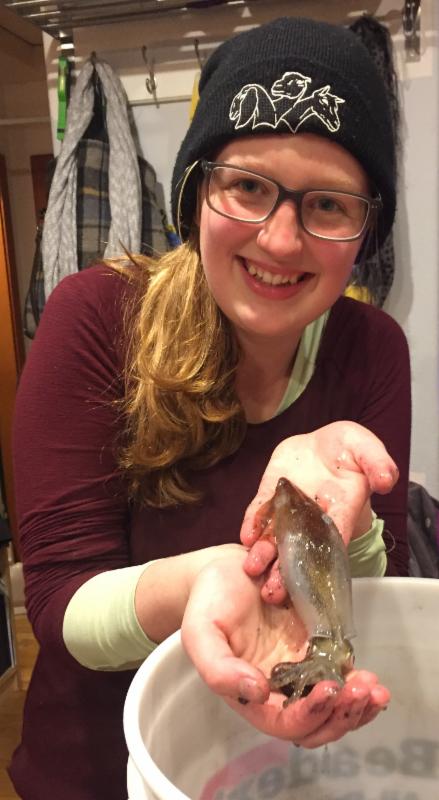
Anna, you are a sophomore student at Chimacum High School, as well as the 2017 Salmon Coalition intern and a member of the Youth Environmental Stewards (YES). What has driven you to become involved in environmental activities?
When my biology teacher told us about the YES program, I thought it sounded intriguing. I like being outdoors and having hands-on experiences. I looked forward to learning more about the nuisances of our local environment. While I was participating in the YES program, Chrissy McLean noticed my interest in botany so she suggested that I consider the Salmon Coalition internship. I was excited to learn more.
What first interested you about environmental conservation?
I first got interested in conservation by learning about sustainable farming practices and how farming can be used to restore land.
You now have several of your own goats. How did you get started?
My youngest sister is unable to consume pasteurized dairy products from cows. The alternatives for her are raw cow milk or goat milk. Where we were living when she was 10 months old, raw milk was unavailable. Pasteurized goat milk it was!
I started volunteering at Whiskey Hill goat dairy where I learned how to take care of goats and started to experiment with making goat cheese. When Diana Dyer decided to scale back her dairy operation I decided to get my own herd started. I knew Diana's goats would be a great start.
The dairy goats are a joy to have as companions. On a daily basis my goats each teach and show me details, ideas, and lessons. I love my goats.
You make different kinds of goat cheese. How did you learn the techniques of cheese making?
Diana gave me a great start, and then I read books and started experimenting. Once I had my own dairy goats, I had enough milk on a regular basis to use for experimentation and try out all sorts of products: yogurt, ice cream, mozzarella, chevre, fromage blanc, feta, and butter. Each creation has been a journey. There have been many errors and surprise outcomes.
I have been making cheese for over three years now. I started for a challenge, for thrill, and for enjoyment. It is magical watching milk coagulate into curd. Then, curds drain to form a mass of cheese that later might be brined or simply embellished with herbs, salt, and other seasonings.
What is your favorite thing that you have done as a YES Student? What about as the Salmon Coalition volunteer?
As part of the YES program, I put plastic tree protectors around the native plants at Illahee Preserve. My 6-year-old sister assisted me for part of the project so we made a game of "Eye Spy" to find the dormant plants. As a NOSC volunteer, I have truly enjoyed working with Olivia Vito to put together a curriculum for Chimacum 6th Graders about carbon sequestration, native plants, and our local ecosystems. One of the best moments of being a NOSC volunteer was when the plant nursery's new soil shed was complete after many hours of coordinating and building!
Have any of these programs helped give you clues as to what you might do when you graduate high school?
I am interested in public policy and human rights law. Through the YES Program and the NOSC internship I have learned more about public relations and would like to learn more about environmental law and how it relates to human rights law.
What is one super cool fact about you that most people don't know?
I have completed several triathlons including a women's only triathlon called the Esprint de She that benefited research for ovarian cancer.
Thank you, Anna!
If you have questions or comments about anything in our newsletter, please don't hesitate to contact us.
outreach@nosc.org
360.379.8051
|
|
|